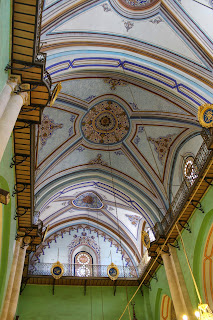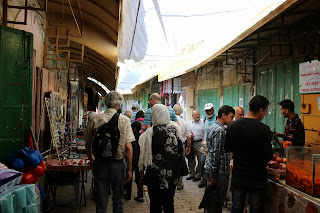As a teenager I listened repeatedly to a haunting song by
Larry Norman based on today’s Gospel reading. It is called ‘I wish we’d all been ready’ and the second verse includes these lines:
‘A man and wife asleep in bed
She hears a noise and turns her head he's gone
I wish we’d all been ready
Two men walking up a hill
One disappears and ones left standing still
I wish we’d all been ready
There's no time to change your mind
The son has come and you've been left behind’
These images, from our Gospel reading (
Matthew 24.36-44), of people being suddenly separated are taken from a block of teaching given by Jesus during his final week in Jerusalem that have become known as his eschatological sermon. This sermon, when combined with the Book of Revelation, has generated a huge amount of speculation about the where, when and how of Jesus’ second coming.
Norman’s song was first released in 1969 and was followed in 1970 by the best-selling book ‘The Late Great Planet Earth’ by
Hal Lindsey. Both were based on the understanding that Jesus’ second coming was imminent and would involve a rapture with Christians being caught up to meet the coming Christ in the sky and non-Christians left behind. Lindsey’s book was influential – a best-seller – and, for a rock fan like me, was encountered again in 1979 when
Bob Dylan released ‘Slow Train Coming,’ his first album after his conversion to Christianity. Dylan studied Lindsey’s book in the Bible classes he attended at the Vineyard Church. The slow train coming of his title was Christ’s second coming and the final song on the album was called ‘When He Returns’. 1979 was also the year in which a film of ‘The Late Great Planet Earth’ was released.
These ideas appealed as a way of understanding current events, as Lindsey tried to fit political decisions and actions to biblical prophecies, and also as a way of emphasising the urgency of making decisions about salvation. If Christ’s second coming and the end of time were just around the corner then decisions about our eternal future should not be postponed. These were appealing ideas to a newly fired up Christian teenager like me.
I now see these dispensationalist approaches to the second coming as constituting an instrumental understanding of salvation. In the same way as the fires of hell have been used as a scare tactic to frighten us into the kingdom of God, so too with the threat of being left behind in the rapture. These understandings of the second coming lead us to view salvation as a transaction that is about our own survival and not about knowing God for God's own sake. They also promise to lift us up out of this world in order that we leave it and those who are unsaved behind. In other words, as Larry Norman expressed it in the title of one album on which ‘I wish we’d all been ready’ appeared, we’re only visiting this planet.
Yet Jesus was most probably talking in this passage, and in the rest of his eschatological sermon, about this-world events that were actually in the near future for the disciples. While the disciples themselves, on the basis of what they understood Jesus to have said, expected his second coming within their lifetime, not at some point in the far distant future.
In my view, as
N.T. Wright has argued, Jesus’ eschatological sermon was not actually about the end of the world but rather about the destruction of the Temple in Jerusalem which occurred in AD70. The destruction of the Temple by the Romans was a time of sudden exile and separation, persecution and loss, as graphically described in today's Gospel reading and as it affected the majority of Jesus’ disciples. There was a sudden attack that resulted in some who were in Jerusalem at the time dying and others separating and fleeing the city; just the kind of events which are described in today’s Gospel reading.
The ultimate proof that a person was a prophet was understood, at the time, as being found in the extent to which their prophecies came about. So, when the destruction of the Temple occurred in AD70, it was proof to Jesus’ disciples that Jesus was a true prophet. This was, for them, the vindication of Christ; he was not a failed Messiah that had been killed on a cross, instead events had proved him to be a true prophet. That meant all he had said about being God’s Son could also be trusted and believed. The destruction of the Temple was, therefore, also a sudden sign of Jesus vindicated, revealed and come again as the Son of Man, the Messiah, God’s Son.
In addition, we heard last Sunday in the reading from
Ephesians 1.15-23 and in
Sally Hitchiner’s sermon that Jesus is the head or source of the Church and we are also told, particularly in Paul’s letters, that the Church is the Body of Christ. On that basis, I think, we can then understand Christ to have returned within the lifetime of his disciples when his Spirit filled them on the Day of Pentecost and the Church was born. The Spirit brings Christ to the Church and the Church becomes Christ for the world. So, as Christ’s renewed Body on earth, the Church became, in the words of Teresa of Avila, the hands and feet of Christ, with which he walks to do good and through which he blesses all the world.
These understandings would then seem to give us two ways in which Christ returned to the disciples within their own lifetime. First, when he filled them with his Spirit giving birth to the Church as the Body of Christ in the world, and, second, when he, and his teachings, were vindicated and proved to be true by the destruction of the Temple in AD70.
The word ‘Advent’ is derived from the Latin word adventus, meaning ‘coming’. Advent has traditionally been observed as a time of preparation for both the celebration of the first coming of Jesus at Christmas and as a time of prayer for the return of Jesus at the Second Coming. It is this second aspect to Advent which results in Jesus’ eschatological sermon featuring heavily in the readings during this season. Advent asks us to reflect on the nature of Jesus’ first and second comings and on how we are to live in the time in between. But, if Christ has already returned, as I am suggesting, what is still to come?
The answer I would give is that the kingdom of heaven is still to come. The Church, although it is the Body of Christ, is not the kingdom of God. The Church only creates signs of the coming kingdom. It was the kingdom of God that was at the heart of Jesus’ teaching. It was the kingdom of God that was demonstrated to us through his birth, life, death and resurrection. Jesus’ incarnation, his first coming, introduced the kingdom of God into the world. Christ's Spirit now teaches us about him, so we can live like him and thereby show others what the kingdom of God looks like. As his Body animated by the Spirit, Jesus is with us enabling the Church to continue to create signs of the kingdom that is to come. However, as it is still to come, it is the kingdom, not Christ, for which we now wait. This is why we are taught to pray for the kingdom to come on earth as in heaven. Rather than looking for ways to escape this world through a second coming and rapture at the end of time, instead we look to see how we can bless the world as Christ’s Body in the here and now.
With this understanding of the second coming we can then see Christianity as an alternative society, overlapping and sharing space with regular society, but living in a different time – that’s to say, modelling God’s future in our present. As
Sam Wells has said: ‘It’s not enough to cherish the scriptures, embody the sacraments, set time aside for prayer, and shape disciples’ character in the ways of truth, if such practices simply withdraw disciples for select periods, uncritically then to return them after a brief pause to a world struggling with inequality, identity, and purpose. The church must also model what the kingdom of God (its term for the alternative society, its language of God’s future now) means and entails in visible and tangible form.’
I want to suggest, then, that these are the comings we remember and on which we reflect in Advent. As a result, to reflect in Advent is to reflect on the whole of salvation history from Christ's first coming to be God with us to the coming of his Spirit at Pentecost that we might become his Body to our future with God in a kingdom where there is no fear and no transactions, only love. Our Advent reflections here this year enable us to focus on both these comings. Inspired to Follow focuses on Christ's first coming, his incarnation, by looking at significant characters in the story of his conception and birth. Our Advent booklet then focuses our thoughts more on the coming kingdom through our prayer for light to come in our present darkness.
Our waiting for the coming kingdom means that there is always more to come where God is concerned. Another singer-songwriter,
Carolyn Ahrends, uses a memory of herself as a three feet tall four year old trying to touch the stars and the cookie jar with both being out of reach, as an image of heaven. She writes of a yearning deep within telling us there's more to come:
‘So when we taste of the divine
It leaves us hungry every time
For one more taste of what awaits
When heaven's gates are reached.’
As we reach for the future this Advent, reaching for what is yet to come and therefore just beyond our grasp, may we realise that the something more which is yet to come is what Christ has already revealed, what we, as the Body of Christ, can sign, and what the coming kingdom of heaven is for.
---------------------------------------------------------------------------------------------------
Carolyn Ahrends -
Reaching.


















































